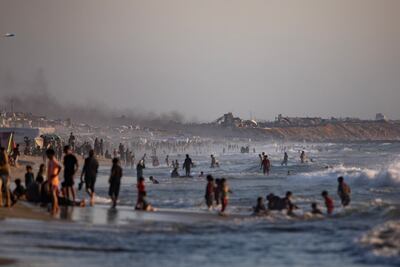For decades, the shores of the Mediterranean have been Gaza's lifeline, its source of food and income, but also a place of refuge and escape from the realities of Israeli occupation. But now, after 21 months of war, even that last refuge has been sealed off.
Israel has issued military orders banning Palestinians in the enclave from one of their last sources of joy – the sea. Gazans are forbidden by new directives from swimming in the waters, while fishermen are prohibited from setting out to sea.
"The forces will deal with any violation to these restrictions," Israeli military spokesman Avichay Adraee said in a post on X. “We urge fishermen, swimmers and divers to refrain from entering the sea. Entering the sea along the strip puts you at risk."
'We live off the sea'
The decision not only ruins the already collapsing fishing industry but also cuts off one of the last remaining spaces where Gazans could breathe, bathe and briefly forget about the daily devastation that surrounds them.
“We live off the sea. If there’s no fishing, we don’t eat,” Munthir Ayash, 52, a fisherman from Gaza city, told The National. “Me, my five sons and their families – 45 people in total – depend entirely on the sea. With it closed, we face starvation.”
Mr Ayash has been fishing since childhood. Like thousands of others, he has braved sniper fire, naval raids and aerial bombardment just to reach Gaza’s nearshore waters, never more than 700 metres from land, due to Israeli-imposed limits.
“Even that short distance was dangerous," he said. "The army fires sound bombs, smoke grenades and bullets. But we kept going. It’s our only way to survive.”
But now, even that risk is no longer possible. The Israeli army has officially declared Gaza’s coastal waters off-limits. For Mr Ayash and many others, this is a telling blow.
Zakaria Bakr, head of the Palestinian Fishermen’s Syndicate in Gaza, believes the move is not a security measure but a deliberate war strategy.
“Since the war began, the sea has been under siege like everything else in Gaza,” Mr Bakr said. “We were only allowed to fish up to 700 metres, a useless range. And any attempt to go further was met with live fire. Many were killed or injured.”
Now, with a full closure in place, Mr Bakr said more than 6,000 people working in the fishing sector will lose their livelihoods. More than 210 have been killed since the war began in October 2023, including 60 fishermen. About 95 per cent of boats and fishing equipment have already been destroyed by Israeli naval and air attacks.“
Fish production is zero now, he said. "It used to be 3,500 tonnes a year. Nothing moves in the sea any more. This isn’t just about fishing, it’s about food security. Two million people in Gaza depended on fish to survive.”

Mr Bakr calls the ban part of a broader, systematic effort to starve Gaza. “This is not about security. It’s economic, social and psychological warfare, a weapon of slow, deliberate suffocation.”
The sea was not only for fishing, it was for living, Ibrahim Dawla, 26, a displaced Palestinian from Gaza’s Al Zaytoun neighbourhood, now living in a tent near the shore, told The National. "I used to go every day. The sea was where I bathed, where I relaxed, where I ran from the horror of war. Now even that’s gone.”
'Where we felt human again'
Mr Dawla, like many Gazans, depended on the sea for basic hygiene in the absence of clean water. It was also one of the few open spaces left where people could gather to talk, swim, or sit, shaded from the destruction.
“People here die a million times every hour, We needed the sea just to feel human again, even if only for a few minutes. And they knew that. That’s why they shut it down,” he said of the Israelis.
Even before the official closure, Israeli gunboats regularly opened fire on beachgoers. Still, people came. “We called it our last breathing space. We knew it was dangerous, but it was the only place we had left.”
Now, he says, the beach is empty. “I haven’t gone for two days. None of my friends have either. We’re all afraid we’ll be shot just for standing there.”
For Gaza’s fishermen, the war has not only destroyed their boats, it has erased a culture, a livelihood passed from father to son for generations.
Mr Ayash recalls how even during past escalations, they could always fall back on the sea. “We could always find a way to fish. It gave us hope. But this time, they want to take everything. They want to erase us.”
He pauses, eyes scanning the shoreline. “But the sea is ours. The land is ours. No matter how hard they try, it will stay ours.”



